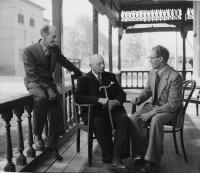As the Heier Tavern meeting ended, Bladeck said, 'Capitalism is the thesis, Communism the anti-thesis; what you have brought may be the synthesis.'14 After seeing The Forgotten Factor, he began to realise implications for himself. The process was precipitated by his daughter pointing out that although he spoke a lot about freedom and democracy from platforms, he was a dictator at home. This cut him to the quick, and soon afterwards he asked a young Norwegian MRA man to stay in his house. In the summer of 1949 he went to Caux, accompanied by his friend Paul Kurowski who, with twenty-five years of Communist Party experience, was conducting the training of Party functionaries in the district. At Caux, they had many conversations with Buchman.
'The atmosphere that surrounded this man was something completely new for me,' Kurowski recalled later. 'It was like a revelation. There was a peace, a love, a caring and a great humility. I had not met a man like this before. We talked about great forces that were moving in the world and he listened very patiently to my ideas. He never tried to convert me. He never tried to answer my anti-religious points of view. He just had faith in the best in me.'15 What struck Bladeck most was 'Buchman's freedom from himself. I felt that here was a man who really subjected his will to a higher Authority.. . . If Lenin were still alive, he would have found the answer to a question he once put to a bishop: "Bring me one man in the whole of Christendom who lives today as Paul lived, and I will have faith!" '16

Rumours of the change in Bladeck and Kurowski reached the Party hierarchy in the Ruhr, who then sent Willy Benedens, a Party secretary in Moers, to Caux to bring them home. He too was convinced by what he saw. All three echoed Kurowski's verdict: 'For twenty-six years I have sung the Internationale with all my heart, but this is the first rime I have seen it lived.'17
When Bladeck, Kurowski and Benedens returned together to the Ruhr, they were called to the Communist headquarters for North Rhine-Westphalia. There they recommended that the Party should make itself acquainted with 'Moral Re-Armament's world-revolutionising idea'. They supported their contention with quotations from Marx and Engels and made it clear they had decided to live a new life 'for logical and realistic reasons'. They did not want to leave the Party; they wanted the Party to take its next step of development, by facing up to the moral standards of absolute honesty, purity, unselfishness and love. Their approach was rejected and they were expelled from the Party at a meeting attended by the chairman of the North Rhine-Westphalia executive, Hugo Paul.
364
Photo: Buchman's message won many Ruhr Marxists such as Paul Kurowski (right) and Max Bladeck (left), both miners.
©Richard N. Haile FIBP FRPS/MRA Productions